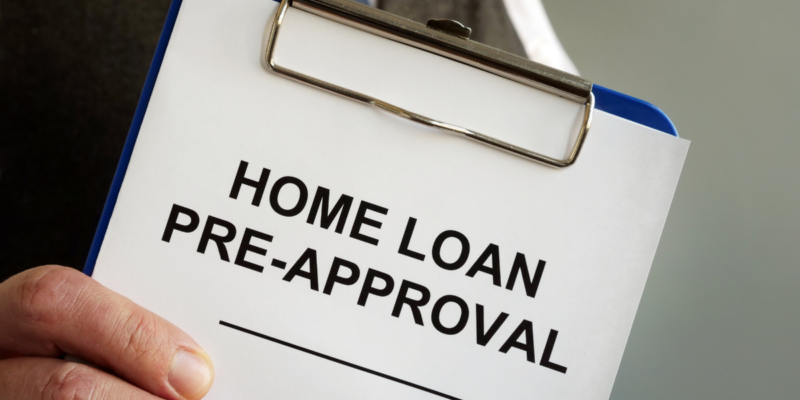
Buying a home is a dream come true for most of us. For a majority of people, the first thing that comes to mind while thinking about buying a home is loan. Taking a loan and repaying it in installments over a period spanning decades is the only affordable way for the middle class to own a home. Applying for a home loan and getting it sanctioned can be a long and tedious process. However, if you are qualified to get a pre-approved home loan, you can consider half the battle won. What is a pre-approved home loan? What makes you qualified to get one? Read on to gain a good grasp on pre-approved home loans.
Table of Contents
Pre-approved Home Loan
As indicated by the name, a pre-approved home loan is an in-principle approval, which suggests, but not guarantees, that an individual is eligible to get a loan before he/she finalises a property. Your qualification for a pre-approved home loan is assessed by analysing various factors such as your financial standing, credit history, net worth, age, as well as repayment history.
Pre-qualification and Pre-approval: The Difference
Though pre-qualification and pre-approval have certain similarities in common, they differ from one another in their fundamental aspects.
A pre-qualification is considered as the first step towards pre-approval. Pre-qualification is mostly verbal and is based on the information you provided to the bank executive. Pre-qualification gives you an idea about the loan amount you would be getting. Contrary to pre-qualification, for pre-approval the bank will do an in-depth analysis of your monthly and annual income, debt-to-income ratio, credit score, the company you work for and your credit history.
Must Read: What is a Home Loan & Types of Home Loan in India
Benefits of Obtaining Pre-approval Before Applying for a Loan
A pre-approved loan comes with a host of benefits. Let’s take a look at each of them.
Super quick process: Since the verification process is done in the pre-approval stage itself, there is no delay unlike in the loan disbursal process.
Better Property Search
A pre-approved loan gives you a fair idea about the money the bank disburses. In addition to these, you already know how much money you have or can arrange. Based on these, you can zero in on a property at the earliest. It is all the more beneficial considering that the housing market is quite competitive, and if not acted on time you could lose the property you had set your eyes on.
Effective Negotiation
A pre-approved loan would make you seem as a serious buyer and the builder will be naturally eager to close the deal with you. As a result, you can negotiate with the seller far more effectively and clinch a lucrative deal.
Must Read: Home Loan Down Payment – The Ultimate Guide
Getting Pre-approval for a Home Loan
As we have already covered what is a pre-approved home loan and what are its benefits, let’s get into the process of obtaining pre-approval for a home loan.
Indeed, the first step towards getting a pre-approved home loan is to apply for it, either by visiting the branch or online. Any person in the age group of 18-70 is eligible to get a pre-approved home loan.
Documents Required to Submit for Pre-Approval
– Employer identity card
– Proof of Identity
– Proof of residence
– Bank account statements for the last 6 months
– Loan account statement for the last 12 months
– Salary slips for the last 3 months
– IT returns or form 16 for the last 2 years
Factors Lenders Consider When Assessing Pre-approval Applications
As already mentioned, various factors including your financial status and credit score are critical in getting a pre-approved home loan. These include analysing how sound you are financially, scrutinising your financial track record, and credit history. For a habitual defaulter, getting a pre-approved home loan is simply not possible. Hence, it is always better to maintain a healthy financial track record when you start earning for yourself.
Advantages of Pre-approved Home Loan for Homebuyers and Lenders
Though we have already covered the advantages of a pre-approved home loan from a buyer’s perspective, for the sake of recap, let’s look into the important points once again in a brief manner.
– Speedy loan disbursal
– Finalising the desired property fast
– More power to negotiate
Does a Lender Gain out of a Pre-approved Home Loan? If so, What are the Advantages?
A pre-approved home loan is sanctioned on the basis of the lender’s financial track record, which includes his/her monthly and annual income, credit score, debt-to-income ratio, age, and the overall ability to repay the loan amount within the stipulated period. Quite naturally, to an extent, lenders can be sure that these individuals won’t default, putting the bank in a fix. This way, a pre-approved home loan is quite advantageous to the banks as well.
Common Mistakes to Avoid During the Pre-approval Process
Five of the most common mistakes that you should avoid at any cost during the pre-approval stage are as follows:
- Don’t apply for a new loan or credit card as these will have an adverse impact on your credit score / debt-to-income ratio.
- Refrain from making major purchases as it will affect your debt-to-income ratio if you make the purchase with credit card or will decrease your assets if you use cash to make the payment.
- Dealing with large amounts of money during pre-approval can delay the process as you will be required to submit proof of income regarding the money.
- Co-signing on a new loan is another mistake you should avoid as it would result in impacting your debt-to-income ratio.
- Quitting or changing jobs can result in delays as the entire process of pre-approval is based on your financial standing, of which your current job is a critical factor.
Things to Keep in Mind When Buying a Home with Pre-approval
In order to sanction a pre-approved loan, the lenders will do a credit enquiry on you – this will lower your CIBIL score.
As mentioned already, the banks have every right to reject your loan approval on account of various factors – be prepared.
If the property you intend to purchase is not authorised by your bank, your pre-approved loan will be rejected.
Usually, a pre-approved loan is time bound – 3 to 6 months ideally. In case it gets expired, you’ll have to reapply.
You will have to pay the same interest rate that was applicable when your loan was pre-approved.
By now, you might have realised the importance of maintaining a healthy credit score, which is not something you can work upon or improve overnight. With due diligence and financial discipline, you can make sure that you will become eligible for a pre-approved home loan.
Must Read: Home Loan Process: A Step-by-Step Guide to Getting Your Dream Home
FAQ’s
1. Who is eligible for a pre-approved home loan?
Any person with a good financial track record is eligible for a pre-approved home loan. The key points that are looked into while considering you for a pre-approved home loan are your monthly and annual income, debt-to-income ratio, credit score, and your credit history.
2. What is pre-approval on a home loan?
A pre-approved home loan is an in-principle approval for a home loan. Unlike normal loans which are sanctioned only after you finalise a property, a pre-approved loan is granted even before you finalise the property.
3. Do pre-approvals affect credit score?
Each pre-approved home loan requires a thorough enquiry from the bank, particularly regarding your credit history. This, in turn, will affect your CIBIL score.
4. How long is a home loan pre-approval valid?
The pre-approval for a home loan is valid for only a particular period. Usually, it is between 3 to 6 months. If the loan is not sanctioned within the period, you’ll be required to reapply.
5. Will I get a loan if preapproved?
A pre-approval is nothing but an in-principal approval. A pre-approval doesn’t guarantee that you will get a loan. To get a pre-approved loan, you’ll be required to meet other criteria such as your credit score, debt-to-income ratio, etc.
6. What is the benefit of a pre-approved loan?
With a pre-approved loan, you can stay focused on the property search, negotiate better, and have an edge in the competitive housing market. The disbursal of the loan is also quick.
7. Is pre-approval a guarantee?
Pre-approval doesn’t guarantee that you will get a loan. Only if you maintain a good credit score, have a steady income and a satisfactory credit-to-income ratio, the bank will sanction your pre-approved home loan.
8. What is the next step after pre-approval?
After pre-approval, the bank will ask you to submit the necessary documents. They are as follows: Employer identity card, proof of Identity, proof of residence, bank account statements for the last 6 months, loan account statement for the last 12 months, salary slips for the last 3 months, IT returns or form 16 for the last 2 years.
9. How long does pre-approval take?
A pre-approval, like any other process, takes a minimum amount of time – usually 7 to 10 days. Of course, it depends on various factors including the veracity of the documents you submitted.
10. Can a bank reject pre-approval?
A bank can reject pre-approval based on various factors. If the bank authorities don’t find that your financial status is healthy, they will reject pre-approval. If you are a habitual defaulter, then also banks can reject pre-approval.










